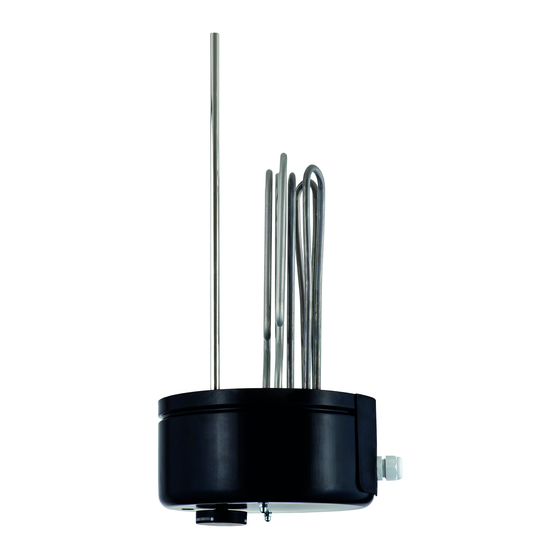Austria Email EBH-TDW Betriebs- und Montageanleitung Handbuch - Seite 12
Blättern Sie online oder laden Sie pdf Betriebs- und Montageanleitung Handbuch für Elektrischer Heizer Austria Email EBH-TDW herunter. Austria Email EBH-TDW 14 Seiten.
Auch für Austria Email EBH-TDW: Betriebs- und Montageanleitung Handbuch (14 seiten)

5.7 First Commissioning
The tank must be filled with water before switching on the electricity.
The expansion water created in the internal boiler during the heating process must drip from the safety valve in the case of a
pressure-proof connection, and from the overflow mixing tap in the case of an unpressurised connection.
The entire initial heating process is to be monitored, from cold water to reaching the set temperature. This will allow possible
defective connections to the electric immersion heater to be detected immediately and other damages resulting from this can be
avoided in time!
Caution: the hot water drain pipe as well as parts of the safety fitting may become hot.
The preset temperature, the actual temperature of the water withdrawn and the hot water quantity display should correspond
approximately after completion of the heating process.
6. INSPECTION, MAINTENANCE, SERVICE
The boiler scale as well as the furring that forms in the internal boiler of the storage tank in the case of heavily calciferous
water must be removed by an expert after one to two years of operation. The cleaning is performed through the flange
opening – de-install the built-in heater, clean the storage tank, use a new seal when mounting the heating flange.
The internal tank of the water heater with special enamelling must not get in contact with boiler scale solvents – do not use
an antiliming pump.
Finally, the device must be rinsed thoroughly and the heating process be observed in the same way as during the first com-
missioning.
In order to be entitled to any claims for warranty, as provided, the installed reactive anode requires documented inspection
by an expert in intervals of maximum 2 years of operation.
The impressed current anode has a virtually unlimited service life. Its function must be regularly monitored via the control
lights (green, yellow, red).
Warning:
If the red LED is lit, no corrosion protection is active! Corrosion protection is only guaranteed if the
green LED lights up continuously.
Should the red or yellow LED light up or flash, please inform Customer Services immediately.
A conductivity value of the medium of ≥ 150 μS/cm is necessary for proper functioning of the external current anode.
The guard circuit shunt resistor must not be damaged or removed during maintenance works.
Do not use any abrasive cleaning agents and paint thinners (such as nitro, trichlor etc.) to clean the device.
The best cleaning method is to use a damp cloth added with a few drops of a liquid household cleaner.
During servicing works, it is advisable to open the cleaning and servicing flange in order to inspect the tank for any foreign
objects that may have been washed in as well as any contamination, and to remove any such, if applicable.
7. MALFUNCTIONS
If the tank water is not heated, please check whether the line circuit breaker (automatic safety cutout) or the
safety fuse in the distribution box have reacted, and check the setting of the temperature control.
In all other cases, do not attempt to rectify the fault yourself. Please contact either a licensed plumber or our custo-
mer service. In many cases, experts only need to do a few little jobs and the storage tank works again. During noti-
fication, please quote your model designation and manufacturing number, which you can find on the rating plate
of your built-in heater.
RECYCLING AND DISPOSAL
•
Always dispose of materials according to environmental, recycling and waste management standards.
•
All appliances, wearing parts, defective components and environmentally hazardous liquids and oils must be
disposed of or recycled according to applicable waste disposal regulations without harming the environment.
They must not be disposed of as household waste.
•
Dispose of packaging made of cardboard, recyclable plastics and synthetic filler materials in an en-vironmentally
responsible manner through appropriate recycling systems or at a recycling centre.
•
Please observe the applicable national and local regulations.
Id.Nr.: 228557-15
12
